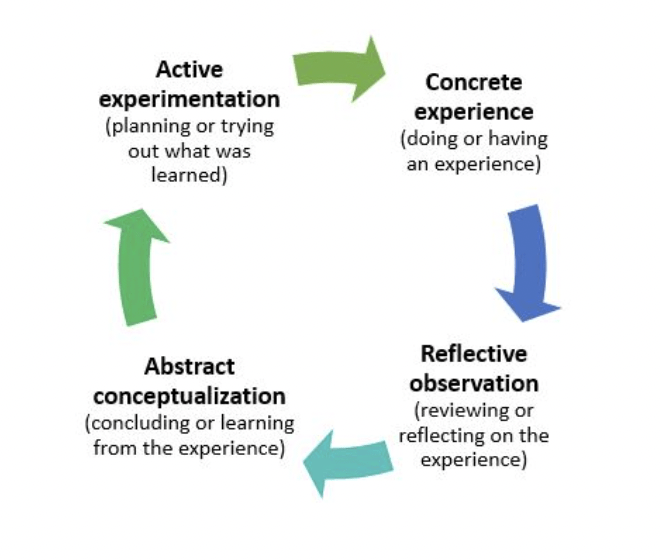Experiential Learning
What It Is
Experiential learning provides learners with an engaging and meaningful experience that lets them “learn by doing.” Through the experience, learners gain valuable skills like decision making, confidence, critical thinking, and creativity. Examples of experiential learning include participation in lab or studio sessions, internships, service learning, study abroad, and makerspaces.
In addition to “doing,” reflection is widely recognized as a key component of experiential learning. In the widely cited Kolb model (1984), conceptualization and experimentation are also key components in the experiential learning cycle.

Why It Matters
Experiential learning gives learners opportunities to learn from successes and failures. Even if a learning experience doesn’t turn out as planned, learners still gain valuable insight about skills difficult to acquire in traditional classroom contexts. Furthermore, some experiential learning opportunities allow learners to begin building a professional portfolio they can leverage in post-college career building.
Apply it
Use each component of the Kolb Cycle in course activities to maximize the benefits of experiential learning.
- – Concrete Experience: Create assignments that support learning outcomes where learners are actively engaged (e.g., field trips, volunteering, laboratory experiments, field interviews).
- – Reflective Observation: Provide opportunities for learners to reflect on their experience (e.g., classroom discussions, journal entries, reflective presentations).
- – Abstract Conceptualization: Connect future assignments with the experience so learners can continue to refine what they’ve learned (e.g., provide readings or facilitate class discussions that address the experience and what they’ve learned).
- – Active Experimentation: Encourage learners to act on what they’ve learned from their experience (e.g., write a report that encompasses primary source documents, field interviews, and reflective analysis).
Resources
- – Explore: Experiential Learning from BU
- – Listen: Engage with Us: Experiential Learning
- – Watch: What is experiential learning?
- – Watch: Engagement Through Experience
- – Watch: Tip of the Week-Experiential Learning
References
Kolb, D. A. (1984). Experiential learning: Experience as the source of learning and development. Prentice-Hall.
Cite This Resource
Studio for Teaching & Learning Innovation. (2023, February). Experiential learning [Teaching resource]. https://stli.wm.edu/experiential-learning/
Updated 2/2023